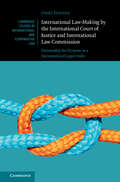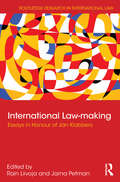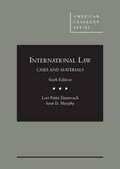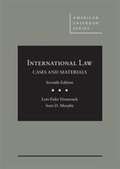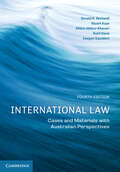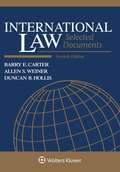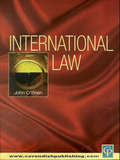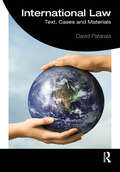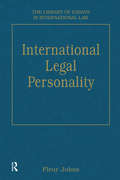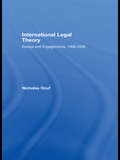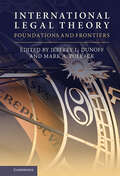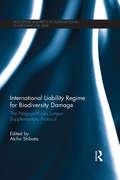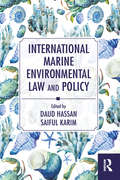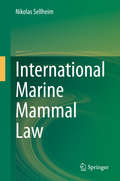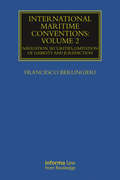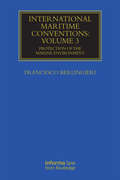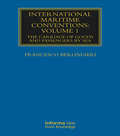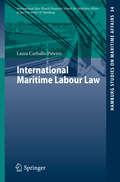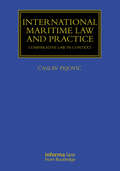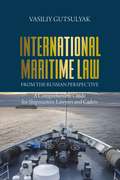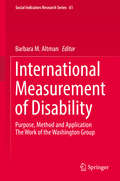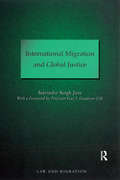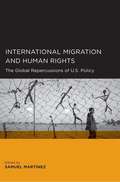- Table View
- List View
International Law-Making by the International Court of Justice and International Law Commission: Partnership for Purpose in a Decentralized Legal Order (Cambridge Studies in International and Comparative Law)
by Omri SenderThe book provides an unparalleled account of the links that draw together the International Court of Justice and the International Law Commission, exposing the depth of the relationship between these central organs of the international legal system and its profound, unintended impact. By drawing upon historical records, as well as interviews with members of both organs, the book reveals that the original vision for interaction between the Court and the Commission has been lost in time. It inquires not only into the cross-fertilization that may be traced in the output of each body but also into the more subtle ties that they nurture; it also shows how even the rare occasions of disagreement attest to the strength of the inter-institutional relationship rather than undermine it. All this throws light on the largely intangible process of international law-making and challenges the notion that international legislation is the sole preserve of States.
International Law-making: Essays in Honour of Jan Klabbers (Routledge Research in International Law)
by Rain Liivoja Jarna PetmanThis book explores law-making in international affairs and is compiled to celebrate the 50th birthday of Professor Jan Klabbers, a leading international law and international relations scholar who has made significant contributions to the understanding of the sources of international legal obligations and the idea of constitutionalism in international law. Inspired by Professor Klabbers’ wide-ranging interests in international law and his interdisciplinary approach, the book examines law-making through a variety of perspectives and seeks to breaks new ground in exploring what it means to think and write about law and its creation. While examining the substance of international law, these contributors raise more general concerns, such as the relationship between law-making and the application of law, the role and conflict between various institutions, and the characteristics of the formal sources of international law. The book will be of great interest to students and academics of legal theory, international relations, and international law.
International Law: Cases and Materials (6th Edition)
by Lori F. Damrosch Sean D. MurphyThis classic international law casebook has been updated to cover recent case law, including the International Court s Extradite or Prosecute (Belgium v. Senegal) case, and the Supreme Court s decisions in Samantar v. Yousef (on foreign sovereign immunity) and Kiobel v. Royal Dutch Petroleum (on the Alien Tort Statute). With extraordinary range and depth, this casebook probes "hot topics" such as the Syrian civil war, the seizure of pirates, and the ICC's indictments of African leaders, all calculated to provoke engaging classroom discussions. This casebook is designed for introductory and advanced classes, with detailed readings on the structure and actors of international law and on specialized areas.
International Law: Cases and Materials (American Casebook)
by Sean D. Murphy Lori Fisler DamroschThis classic international law casebook is updated to cover recent case law, including the arbitral decision in the South China Sea Arbitration (Philippines v. China), the International Court of Justice’s Certain Activities carried out by Nicaragua in the Border Area (Costa Rica v. Nicaragua) case, and the U.S. Supreme Court’s ruling in Jesner v. Arab Bank. With extraordinary range and depth, this casebook probes "hot topics" such as cyber-attacks, the Paris Agreement on climate change, developments in the International Criminal Court’s Al-Bashir proceedings, and complaints of racial discrimination by Palestine against Israel and by Qatar against the United Arab Emirates, all calculated to provoke engaging classroom discussions. This casebook is designed for introductory and advanced classes.
International Law: Cases and Materials with Australian Perspectives
by Stuart Kaye Afshin Akhtar-Khavari Donald R Rothwell Imogen Saunders Ruth A DavisInternational law is constantly adapting in response to developments in State practice, new treaties and an expanding international jurisprudence. International Law: Cases and Materials with Australian Perspectives provides students with up-to-date coverage of changing laws and their practical applications through a uniquely Australian lens. The fourth edition re-examines the principles and application of international law following major world events including the COVID-19 pandemic, Russia's invasion of Ukraine and the ongoing Israel–Palestine conflict. The student-friendly text has been thoroughly updated to reflect landmark cases and developments in the law resulting from these events, as well as the ongoing challenges of climate change, crimes against humanity, genocide, human rights abuses, nuclear proliferation, resource management, self-determination of peoples, and new treaties dealing with the high seas. Each chapter includes suggested further readings to encourage independent study. Written by an expert author team, International Law remains an essential resource for Australian law students.
International Law: Selected Documents
by Allen Weiner Duncan HollisInternational Law: Selected Documents, Seventh Edition
International Law: Solutions (1999-2000 Llb Examination Questions And Suggested Solutions Ser.)
by John O'BrienFirst published in 2001. Routledge is an imprint of Taylor & Francis, an informa company.
International Law: Text, Cases and Materials
by David PataraiaInternational Law: Text, Cases and Materials provides not only an essential introduction to the core concepts and foundational principles of international law, but also a detailed overview of each established area in which international law operates. Featuring cases, materials, and illustrative figures throughout to enhance the level of context and detail provided, the book covers everything a student of international law requires. Topics include the law of treaties, international organisations, the international protection of human rights, responsibility in international law, jurisdiction, diplomatic and consular law, territory in international law, the law of the sea, international air and space law, international economic law, international environmental law, and international humanitarian law. This comprehensive textbook will be essential reading not only for any course on international law, but also as a starting point for those wishing to grasp the context of a particular area of international law before exploring further.
International Legal English: A Practical Introduction for Students and Professionals
by Rupert HaighEnglish is the dominant language of international business relations, and a good working knowledge of the language is essential for today’s legal or business professional. This book provides a highly practical approach to the use of English in commercial legal contexts, and covers crucial law terminology and legal concepts. Written with the needs of both students and practitioners in mind, this book is particularly suitable for readers whose first language is not English but need to use English on a regular basis in legal contexts. The book covers both written and verbal legal communication in typical legal situations in a straightforward manner. In addition to chapters on the grammar and punctuation utilised in legal writing, the book features sections on contract-drafting and the language used in negotiations, meetings and telephone conversations. It features a companion website which contains exercises covering the majority of the topics covered in the book’s chapters. This edition thoroughly revises and expands the content of the companion website and contains updated examples, more detailed explanations of problematic areas and an expanded section on writing law essays.
International Legal Personality (The\library Of Essays In International Law Ser.)
by Fleur JohnsWho or what is entitled to act on the international plane? Where should responsibility for violations of international law lie? What sort of entities are capable of possessing international legal rights? What is the status of individuals, minority groups, non-governmental bodies, international organisations and animals in the international legal order and how has their status shifted over time? International Legal Personality contains fourteen articles that address these and related questions. In historical and contemporary writings, international lawyers grapple with the nature of legal identity, and confront global distributions of authority and responsibility, as they explore who or what is a 'person' in the international legal order. These essays document the emergence of an international legal order increasingly conceived in terms of patterns and probabilities, rather than as the stagecraft of a small company of permanent players.
International Legal Theory: Essays and engagements, 1966-2006 (Routledge Research in International Law)
by Nicholas OnufNicholas Onuf’s International Legal Theory: Essays and Engagements 1966-2007 is a collection of the author’s articles and book reviews from the period, including some previously unpublished material. The book records the author’s efforts to address important problems in international legal theory and to engage other scholars who were also addressing these problems. As well as demonstrating Onuf’s own constructivist contribution to the theoretical dimension of international law and international relations, each piece is preceded by a short introduction which highlights the wider themes and developments which have occurred in the field of international law in the last forty years.
International Legal Theory: Foundations and Frontiers
by Jeffrey L. Dunoff Mark A. PollackOver the past decades international affairs have been increasingly legalized. International law has dramatically expanded into new fields and taken on new challenges. Despite this development, there has been little in-depth scholarship on what impact these changes have had on the field of international legal theory, how it is taught, and where it is going. This volume investigates the major developments in the field and explores the core assumptions and concepts, analytical tools, and key challenges associated with different approaches. An outstanding team of legal academics provides an accessible overview of competing theoretical movements, and a more in-depth understanding of the strengths, preoccupations, insights, and limits of those schools of thought. The contributions provide an authoritative account of current thinking about the theoretical foundations of contemporary international law and will serve as an indispensable resource for students, scholars, and practitioners.
International Liability Regime for Biodiversity Damage: The Nagoya-Kuala Lumpur Supplementary Protocol (Routledge Research in International Environmental Law)
by Akiho ShibataThe Nagoya-Kuala Lumpur Supplementary Protocol on Liability and Redress to the Cartagena Protocol on Biosafety, adopted on 15 October 2010 in Nagoya, Japan, provides an international liability regime for biodiversity damage caused by living modified organisms (LMOs). Its adoption marks a significant development in the legal design for international environmental liability regimes, as it incorporates for the first time in global treaties an administrative approach to liability. This book examines the Supplementary Protocol from both practitioner and academic perspectives. In its three parts the book explores the historical development, legal significances, and future implementation of the core provisions of the Supplementary Protocol, focusing specifically on its incorporation of an administrative approach to liability for biodiversity damage and its relation to civil liability. Contributors to the volume include Co-Chairs of the negotiating group and the negotiators and advisors from some of the key negotiating Parties, offering valuable insights into the difficult-to-read provisions of the Supplementary Protocol. The book demonstrates the significant changes in the political configuration of environmental treaty negotiations which have come about in the twenty-first century, and argues that the liability approach of the Supplementary Protocol has important implications for future development of international liability regimes under international environmental law.
International Marine Environmental Law and Policy
by Daud Hassan Saiful KarimSeveral disturbing issues pose a threat to the marine environment and its wellbeing, among them marine environmental pollution and degradation of marine biodiversity. Most troubling is that these issues are overwhelmingly caused by human activities which are sometimes transboundary, and their consequences will become more severe and complicated if not properly curbed. Thus, these activities require comprehensive policies, laws, and principles to manage them effectively. Linked to these solutions is the need for responsibilities, cooperation and commitments at local, national, regional and international levels. Contemporary Marine Environmental Law and Policy presents a thorough appraisal of the main issues, actors and institutions engaged in the legal aspects of marine environmental conservation. With contributions from an international range of authors, the book provides a concise account of the legal and policy framework underlying international marine environmental issues, and of the fundamental concepts and strategies that are important to the protection of the marine environment. Some of the topics explored include: the prevention of marine pollution caused by land based activities, ships, and offshore hydrocarbon and mineral resources exploration; the conservation and management of marine living resources; the marine environment in the polar regions; and the settlement of marine environmental disputes. This book provides a solid foundation for anyone studying International Environmental Law and the Law of the Sea. It will also appeal to anyone seeking to gain a deeper understanding of this hugely important subject.
International Marine Mammal Law
by Nikolas SellheimInternational Marine Mammal Law is a comprehensive, introductory volume on the legal regimes governing the conservation and utilisation of marine mammals. Written as a textbook, it provides basic overviews of international conservation law, which enable the reader to understand the greater implications of governance of a specific group of species. Paired with biological information on some marine mammal species, the international regimes for whales, seals and polar bears are explored — either as part of global regimes of international environmental governance or as regimes that were specifically designed for them. The book concludes with outlooks on the future of international marine mammal law, particularly in light of Japan’s withdrawal from the International Convention for the Regulation of Whaling in July 2019.
International Maritime Conventions: Navigation, Securities, Limitation of Liability and Jurisdiction (Maritime and Transport Law Library)
by Francesco BerlingieriFor the first time, this unique text brings together all private international maritime law conventions alongside expert commentary and analysis. Truly global in approach, the book covers each of the nineteen conventions currently in force, all scrutinised by this internationally-acclaimed author. It also examines important maritime conventions not yet fully ratified, including the topical Rotterdam Rules. This comprehensive resource provides a thorough treatment of both wet and dry shipping treaties, combining breadth of coverage with depth of analysis. In this second volume, the author covers the key conventions dealing with collision, salvage, maritime liens and mortgages, arrest of ships, and limitation of liability. In particular, the author covers: International Convention for the unification of Certain Rules of Law with respect to Collision between Vessels, 1910 International Convention on certain Rules Concerning Civil Jurisdiction in Matters of Collision, 1952 International Convention for the Unification of Certain Rules Relating to Penal Jurisdiction in Matters of Collision or Other Incidents of Navigation, 1952 International Convention for the Unification of Certain Rules of Law Relating to Assistance and Salvage at Sea, 1910 International Convention on Salvage, 1989 International Convention for the Unification of Certain Rules Relating to Maritime Liens and Mortgages, 1926 International Convention on Maritime Liens and Mortgages 1993 International Convention relating to the Arrest of Sea-Going Ships, 1952 International Convention on Arrest of Ships, 1999 International Convention Relating to the Limitation of Liability of Owners of Sea-Going Ships, 1957 and Protocol of 21 December 1979 International Convention on Limitation of Liability for Maritime Claims, 1976 and Protocol of 1996 This book is an indispensable reference for maritime lawyers, academics and students of maritime law worldwide.
International Maritime Conventions: Protection of the Marine Environment (Maritime and Transport Law Library)
by Francesco BerlingieriFor the first time, this unique text brings together all private international maritime law conventions alongside expert commentary and analysis. Truly global in approach, the book covers each of the nineteen conventions currently in force, all scrutinised by this internationally-acclaimed author. It also examines important maritime conventions not yet fully ratified, including the topical Rotterdam Rules. This comprehensive resource provides a thorough treatment of both wet and dry shipping treaties, combining breadth of coverage with depth of analysis. In this third volume, the author covers the key conventions dealing with pollution and safety at sea. In particular, the author covers the following instruments: International Convention relating to Intervention on the High Seas in Cases of Oil Pollution Casualties, 1969 and Protocol of 1973 International Convention on Oil Pollution Preparedness, Response and Co-operation, 1990 (OPRC Convention) with its Protocol of 2000 (OPRC-HNS Protocol) International Convention for the prevention of pollution from ships (MARPOL) and protocol of 1978 International Convention for the Safety of life at sea, 1974 (SOLAS) Convention on the prevention of marine pollution by dumping of wastes and other matters, 1972 as amended by the protocol of 1996 International Convention for the control and management of ship’s ballast water and sediments, 2004 International Convention on Standards of Training, Certification and Watchkeeping for Seafarers, 1978 Nairobi International Convention on removal of wrecks 18 may 2007 Port state control: the Paris Memorandum of Understanding and the European Directive 2009/16 EC European Traffic Monitoring and Information System International Convention on Civil Liability for Oil Pollution Damage, 1992 (CLC 1992) International Convention on the Establishment of an International Fund for Compensation for Oil Pollution Damage, 1992, as amended by its Protocol of 2000 and its Supplementary Protocol of 2003 (the Fund Convention) International Convention on Civil Liability for Bunker Oil Pollution Damage, 2001 International Convention on Liability and Compensation for Damage in Connection with Carriage of Hazardous and Noxious Substances by Sea, 1996 This book is an indispensable reference for maritime lawyers, academics and students of maritime law worldwide.
International Maritime Conventions: The Carriage of Goods and Passengers by Sea (Maritime and Transport Law Library)
by Francesco BerlingieriFor the first time, this unique text brings together all private international maritime law conventions alongside expert commentary and analysis. Truly global in approach, the book covers each of the nineteen conventions currently in force, all scrutinised by this internationally-acclaimed author. It also examines important maritime conventions not yet in force, including the topical Rotterdam Rules. Split into three convenient volumes, this comprehensive resource provides a thorough treatment of both wet and dry shipping treaties, combining breadth of coverage with depth of analysis. In this first volume, the author covers conventions dealing with the Carriage of Goods and Passengers by Sea, in particular: - International Convention for the Unification of Certain Rules of Law Relating to Bills of Lading, 1924 and its Protocol of 1968 and 1979 (Hague-Visby Rules) - United Nations Convention on the Carriage of Goods by Sea, 1978 (Hamburg Rules) - United Nations Convention on the International Carriage of Goods wholly or Partly by Sea, 2008 (Rotterdam Rules) - Athens Convention Relating to the Carriage of Passengers and their Luggage by Sea, 1974 as amended by its Protocol of 2002 (Athens Convention) This book is an indispensable reference for maritime lawyers, academics and students of maritime law worldwide.
International Maritime Labour Law
by Laura Carballo PiñeiroThis book focuses on maritime employment from a private international law perspective. The first chapter analyzes the background against which international jurisdiction and conflict of laws rules are drawn up and examines uniform law in this context, in particular the 2006 Maritime Labour Convention and the 2007 ILO Convention No. 188 on Work in Fishing. The second chapter addresses international jurisdiction issues as regards individual employment contracts, while also exploring other issues (e. g. insolvency-related and social security matters) that are subsequently revisited in the third chapter while discussing conflict of laws issues related to said contracts. In turn, chapter four focuses on collective labour relations and private international law, i. e. collective agreements, strikes and other forms of collective action and information, and on the participation rights of employees in business matters.
International Maritime Law and Practice: Comparative Law in Context (Maritime and Transport Law Library)
by Časlav PejovićThis book provides a different perspective on the ever-popular topic of maritime law, emphasising historical and comparative aspects. It provides the reader with a broader view of how maritime law has developed throughout history and operates within various legal systems. Each chapter starts with historical development, meticulously explaining the development of various maritime law concepts to enable a higher level of understanding in the contemporary context.The text adopts a comprehensive comparative approach that has two segments. One segment is related to the coverage of several major maritime jurisdictions. Focusing mainly on English law, it also provides selected legislation and essential case law information from several other jurisdictions (US, France, Germany, Italy, Japan, China, etc), many of which are not easily accessible in English. The other relates to the comparison between common law and civil law on a general level.This book will be of significant interest to lawyers working in shipping companies, law firms specializing in shipping, international organizations related to shipping and maritime law, and international traders. It also provides invaluable aid to shipmasters and ship officers, empowering them with the knowledge to effectively deal with various maritime law issues in their professional activities. The book's content will be of direct relevance to maritime law scholars and students, enhancing their understanding of this complex field.
International Maritime Law from the Russian Perspective: A Comprehensive Guide for Shipmasters, Lawyers and Cadets
by Vasiliy GutsulyakThis book is one of the most comprehensive guides to international maritime law from the Russian perspective. It consists of three relatively independent sections: Russian Maritime Law, International Public Maritime Law, and International Private Maritime Law.°First section discusses the development of the maritime law as a branch of the Russian law. It examines concepts and sources of the Russian federal laws, secondary legislation and customs, including the influences guiding the future of Russian law of the sea.°The second section examines International Public Maritime Law including the principles, sources, subjects, as well legal status of the vessel, including the vessel's state flag, her name, state registration, the problem of "flags of convenience", vessel's documents, the crew, and the master. This section further details the current international legal regime of maritime spaces, provisions concerning legal protection of marine environments, ensuring navigation safety, international legal regulation of the work of seamen, international inter-governmental marine organizations, and settlement of international public marine disputes.°The third section is devoted to International Private Maritime Law and discusses its principles and sources, conflict-of-law rules, structure and types, and the main choice-of-law principles used today in international private maritime law. This section also discusses the following institutions and sub-branches within international private maritime law including: carriage of cargoes and passengers by sea, general average, salvage, collisions of vessels, marine insurance, limitation of liability, international non-governmental maritime organizations, and settlement of international private marine disputes.
International Measurement of Disability
by Barbara M. AltmanThis volume provides an informed review of the accomplishments of the Washington Group on Disability Statistics (WG) in the provision of international data and statistics on disability. It does so within the context of the UN Convention on the Rights of Persons with Disabilities. The volume includes a description of the development and testing of a short set of questions for Censuses, now used in approximately 29 countries and recommended in the U. N. 's Principles and Recommendations for Population and Housing Censuses: The 2020 Round, which includes disability as a core topic to be collected in censuses. It discusses the experiences of several countries on the use of the WG questions and how this has impacted on national agendas in the area of disability. It follows the development and testing of an extended set of questions for use in national surveys other than censuses and examines the challenges of translation and the importance of generating comparable question sets in different languages and within different cultures. It studies the examination of cognitive testing techniques in a variety of countries, and presents the results of the first round of censuses in 2010 in countries using the six question set. The volume includes discussions of the new development of question modules on a broad range of child disability and functioning, and the environmental contexts of participation that are part of the current work of the WG. In addition, it contains a reflection on the use of the WG's functionality approach to identifying disabilities by humanitarian agencies to identify disabilities in populations of displaced persons. A thoughtful conclusion addresses what the development of cross-nationally comparable data can mean for the improvement of circumstances for all persons with disabilities.
International Migration
by Susan F. MartinStates have long been wary of putting international migration on the global agenda. As an issue that defines sovereignty - that is, who enters and remains on a state's territory - international migration has called for protection of national prerogatives and unilateral actions. However, since the end of World War I, governments have sought ways to address various aspects of international migration in a collaborative manner. This book examines how these efforts to increase international cooperation have evolved from the early twentieth century to the present. The scope encompasses all of the components of international migration: labor migration, family reunification, refugees, human trafficking and smuggling, and newly emerging forms of displacement (including movements likely to result from global climate change). The final chapter assesses the progress (and lack thereof) in developing an international migration regime and makes recommendations towards strengthening international cooperation in this area.
International Migration and Global Justice (Law and Migration)
by Satvinder JussHow should international law approach the critical issue of movement of peoples in the 21st century? This book presents a radical reappraisal of this controversial problem. Challenging present-day ideas of restrictions on freedom of movement and the international structure that controls entry to states, it argues for a new blueprint for international migration policy that eliminates waste, aids both developing and developed societies and brings attendant benefits to voluntary migrants and involuntary refugees alike. In a world of increasing disorder, it is suggested that current policy only adds to international instability and threatens the interests of a functional global community.
International Migration and Human Rights: The Global Repercussions of U.S. Policy
by Samuel MartínezThis book contains essays divided into four sections, each section developing a different angle on the repercussions of U.S. policy for the rights of migrants at different points in history and in various parts of the world.
